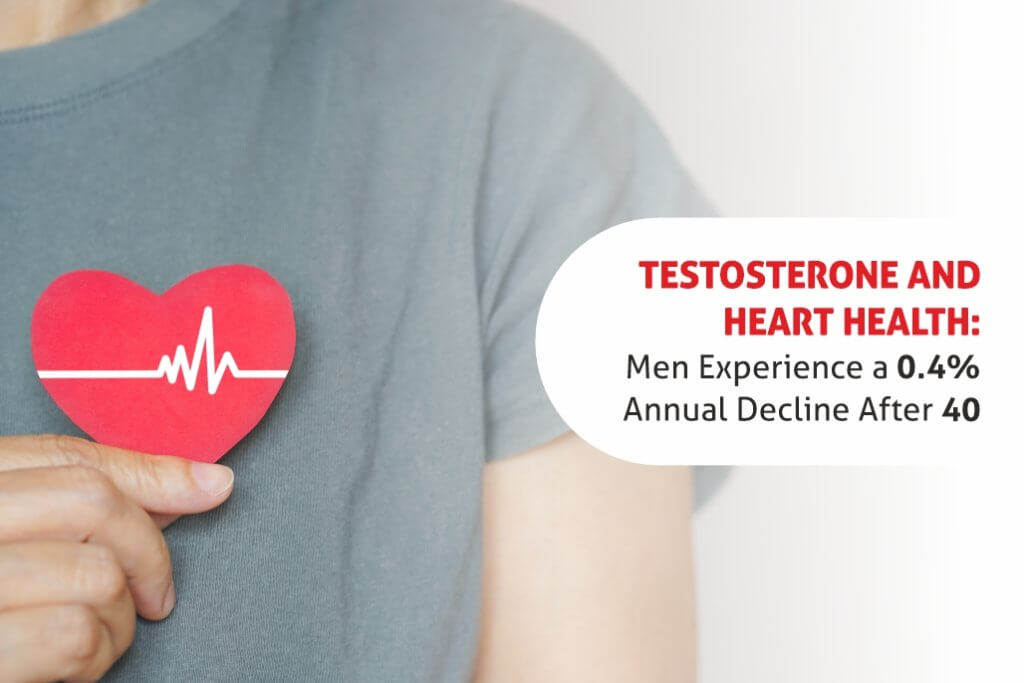
Turning 40 is a significant milestone that brings wisdom, experience, and unfortunately, an increased risk for heart disease. While this may sound alarming, the good news is that understanding these changes and taking proactive steps can dramatically reduce your cardiovascular risk and help you maintain a healthy heart for a decade to come.
The human heart undergoes several natural changes as we age, making the fifth decade of life a crucial period for cardiovascular health. Research shows that cardiovascular disease risk jumps dramatically after 40, with the American Heart Association reporting that about 40% of men and women develop CVD between ages 40-59.
Arterial Stiffening and Blood Vessel Changes. Your blood vessels naturally lose elasticity as you age, a process called arteriosclerosis. This “hardening of the arteries” forces your heart to work harder to pump blood efficiently, leading to higher blood pressure and increased strain on the heart muscle. Over time, this can result in hypertension and other cardiovascular complications.
The left ventricle, your heart’s main pumping chamber, may thicken to compensate for increased resistance from stiff arteries. While this might seem like a positive adaptation, it actually reduces the heart’s ability to fill effectively and can eventually lead to heart failure.
Your heart’s natural pacemaker becomes less reliable with age, increasing the risk of arrhythmias(irregular heartbeats). These can cause palpitation, dizziness, or, in severe cases, sudden cardiac arrest.
After 40, the accumulation of cholesterol, calcium, and other substances in your coronary arteries tends to accelerate significantly. This buildup increases the risk of coronary artery disease and heart attacks.
Heart disease affects men and women differently, and understanding these differences is crucial for effective prevention.
Women have a unique cardiovascular advantage until menopause due to estrogen’s protective effects. However, this changes dramatically around age 50. Research shows that a woman’s cardiovascular risk can rise sharply after menopause, quickly catching up to men of similar age. The decline in estrogen level during menopause leads to several concerning changes:
Women with early menopause ( before age 45) face even higher cardiovascular risks. The lifetime risk of developing coronary heart diseases by age 40 is 33% for women compared to 50% for men, but this gap narrows significantly after menopause.

Men face different challenges as testosterone levels begin declining after age 40. Low testosterone has been associated with increased cardiovascular mortality and higher risk of developing coronary artery disease, metabolic syndrome, and type 2 diabetes.
However, the relationship between testosterone therapy and heart health remains complex. While some studies suggest benefits, others indicate potential risks, particularly for men over 65. The key takeaway is that natural age-related testosterone decline should be monitored as part of comprehensive heart health management.
Target: Less than 130/80 mmHg according to current guidelines
High blood pressure is often called the “silent killer” because it can damage blood vessels without obvious symptoms. Adults should have their blood pressure checked at least annually, or more frequently if elevated.
Targets: Total cholesterol less than 200 mg/dL, LDL cholesterol less than 100 mg/dL
Most healthy adults should have cholesterol checked every 4-6 years, but those with heart disease risk factors may need more frequent monitoring.
Diabetes dramatically increases heart disease risk, with diabetic women facing 50% higher risk of fatal coronary heart disease compared to diabetic men. Regular glucose testing helps identify prediabetes and diabetes early.
Maintaining a healthy weight becomes more challenging after 40 due to metabolic changes. Even a 5-10% weight reduction can significantly improve heart health markers.
The Mediterranean and DASH diets remain the gold standard for heart-healthy eating. Focus on:
What to Limit:
Minimum Recommendations:
Regular exercise strengthens your heart muscle, improves circulation, helps control weight, and reduces blood pressure and cholesterol levels. Even small amounts of activity provide benefits – just five minutes of movement can help.
Chronic stress contributes to heart disease through multiple pathways, including elevated blood pressure and inflammatory responses. Effective stress management techniques include:
If you smoke, quitting is the single most important step you can take for your heart health. The risk of heart disease starts dropping within 24 hours of quitting, and after one year, your risk drops to about half that of a smoker.
After 40, comprehensive heart screening should occur every 1-2 years, or more frequently if you have risk factors. Essential tests includes:
Basis Screening:
Advanced Testing (when indicated):
For those seeking the best heart hospital in Ahmedabad or consultation with a top cardiologist in Ahmedabad, regular screenings provide the foundation for personalized heart health strategies.
Immediate Steps:
Long-term Strategies:
Long-term Strategies:
For residents in Ahmedabad and nearby, Shalby Hospital stands out as the best heart hospital in Ahmedabad, providing world-class cardiac care with a full range of diagnostic and treatment services. With a dedicated Cardiology department staffed by some of the top cardiologists in Ahmedabad, Shalby offers personalized treatment plans for all heart conditions.
Their comprehensive cardiac care includes:
Shalby Hospital’s cardiac care facilities are equipped with the latest technology matching international standards. Patients benefit from expert care by trained cardiologists like Dr. Shalin Thakore and Dr. Varun Sibal, among others, who are renowned for their expertise and compassionate approach.
Heart health after 40 requires attention, but it’s absolutely manageable with the right approach. The key is understanding that while aging brings natural changes to your cardiovascular system, lifestyle modifications can significantly reduce your risk of heart disease. Whether you’re a man dealing with hormonal changes or a woman approaching menopause, proactive heart care – including regular screenings, healthy lifestyle choices, and working with qualified cardiologists – can help ensure your heart remains strong for years to come.
World Heart Day on September 29, 2025, serves as a critical reminder that cardiovascular disease remains the number one cause of death globally. With the theme “Don’t Miss a Beat” for 2025, this year’s campaign emphasized the urgent need for proactive heart...
Turning 40 is a significant milestone that brings wisdom, experience, and unfortunately, an increased risk for heart disease. While this may sound alarming, the good news is that understanding these changes and taking proactive steps can dramatically reduce your cardiovascular risk and...
In today’s demanding world, stress has practically become a constant companion for many. While a little stress can give you that push to meet daily challenges, chronic stress often flies under the radar, slowly impacting your well-being—most noticeably your heart health. This...